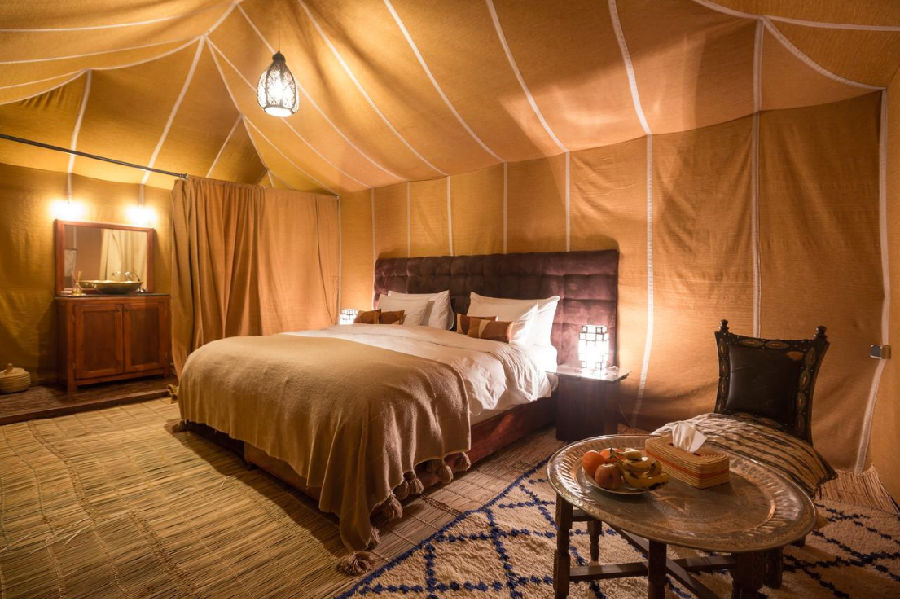(单词翻译:单击)
听力文本
Now, the VOA Learning English program Words and Their Stories.
For many people, camping is a popular outdoor activity. Camping is for people who like to feel one with nature. They like sleeping, playing, eating and washing (or not washing) in the open air. In fact, they often like camping a lot more than staying at home.
Camping is not always easy. But people who like camping like roughing it. In other words, they don't mind leaving their creature comforts at home. For example, they do not mind sleeping in a tent on the ground. They don't mind cooking and eating outside -- or doing anything outside.

But not everyone likes sleeping on the ground or washing up in a cold lake. Even people who like being out in nature may still like to get a good night's sleep on a soft, comfortable bed.
For these types of people, glamping may be more appealing.
"Glamping" combines two other words, "glamour" and "camping."
I have been camping. But I have never been glamping. My friend Lisa has. So, I invited her into the studio to describe her glamping experience. Here is part of our conversation.
ANNA: What is "glamping"? How would you describe "glamping"?
LISA: Well, "glamping" is actually "glamorous camping," right? So, that's where glamping came from. So, it's camping without all of the downsides.
ANNA: Would you consider yourself a "glamper"? Have you glamped?
LISA: I have glamped.
ANNA: We don't really use the word that way, do we?
LISA: No. I've never even heard someone say "to glamp."
ANNA: It's a new word.
LISA: It is a new word, I think. I have gone glamping. And we went to this fabulous resort with these yurts. It's a big round circular tent with like a wooden frame. But this particular yurt has under-floor heating and like a beautiful spa bathroom and a wood stove and fuzzy bathrobes hanging in the corner. What else do you need? And baskets of muffins delivered to your doorstep in the morning.
ANNA: That does not sound like camping. But yet, you are outside sleeping in a fabric enclosure – a yurt.
LISA: That's right.
ANNA: Yeah, it would be hard to go back to camping once you've been glamping, I have to say.
LISA: Yes, I think that's very true. In fact, it may be possible that I have not been camping since I went glamping.
ANNA: So, Lisa if you're free this summer how would you like to go camping with me?
LISA: I would much rather go glamping with you. How do you feel about glamping?
ANNA: The way that you've described it, I could do glamping for a longer period of time than I could camping. I do like camping. But glamping sounds really awesome.
LISA: Glamping is fabulous. And if you're doing it right, there's a restaurant nearby so you don't even have to cook.
Now, there is no reason you have to choose between camping and glamping. Perhaps you like to do both. You have your feet in both camps, so to speak.
When you have your feet in both camps, you are supporting or are involved with competing sides -- or at least two very different sides.
Sometimes, we use this expression when supporting both sides is a good thing. For example, let's say two friends of yours are having a big fight, and they stop talking to each other. You, however, want to stay out of the conflict. So, you talk with both of them. You keep your feet in both camps.
But sometimes the expression carries with it the feeling that there is something dishonest going on. In other words, maybe a person is supporting both parties but not saying so. I imagine that this happens in the world of politics quite a bit.
But let's not end this Words and Their Stories in politics. Let's go back to nature.
Which camp are your feet in: camping or glamping?
I'm Anna Matteo. Special thanks to my friend Lisa for joining me on the program.
重点解析
1.rough it 过艰苦的生活;生活简单;因陋就简地生活
We're going up to the mountains to rough it for a week.
我们要去山上过一星期简单而艰苦的生活。
2.wash up 洗餐具;洗手洗脸;洗涤餐具
Having put the children to bed, she popped out to wash up.
让孩子们睡好后,她赶紧出去洗餐具。
3.so to speak 更不用说;那么……就……;也可说,可以这样说;可谓,可以这么说;不妨说;好比;如同
It was an indoor snow set, and I'd never been on or seen indoor snow so to speak, so it was fun.
那是一个室内雪景,我从来没有见过或深处室内雪景,这么说吧,非常有意思。
参考译文
现在是VOA学英语《词汇掌故》节目时间。
对于很多人来说,露营(camping)是一项很受他们喜爱的户外活动。露营适合那类喜欢亲近自然的人们。他们喜欢在户外睡觉、娱乐、就餐以及洗衣(不洗衣也可以)。实际上,相较于待在家里,他们往往更喜欢露营。
露营不总是简单的事情。但是热爱露营的人喜欢过简单生活(rough it)。换句话说,他们不介意抛弃家里的舒适享受(creature comforts)。例如,他们不介意睡在地上的帐篷里。他们不介意在户外做饭、吃饭,或者做任何事情。
但不是每个人都喜欢睡在地上或者在冰冷的湖里洗刷碗碟。即使是喜欢身处自然的人也依然喜欢在一张软和舒适的床上睡个好觉。
对于这类人,“豪华野营(glamping)”也许更具吸引力。
“glamping”结合了两个单词:“glamour(魅力)”和“camping(露营)”。
我野营过。但我从未豪华野营过。我的朋友莉莎豪华野营过。所以,我邀请她来到我们的演播室,描述下她的豪华野营体验。下面是我和她的部分对话内容。
安娜:“glamping(豪华野营)”是什么?你会如何描述它?
莉莎:好的,“glamping(豪华野营)”实际上是“glamorous camping(魅力露营)”,对吧?那么,这就是“glamping”的由来。因此,“豪华野营”就是没有任何消极面的野营。
安娜:你认为自己是一个“豪华野营者”吗?你豪华露营过吗?
莉莎:我有豪华野营过。
安娜:我们其实不是这样用这个单词的,是吗?
莉莎:是的。我从来没听过别人说“to glamp”。
安娜:这是个新词。
莉莎:我想这是个新词。我去豪华野营过。我们带着这些圆顶帐篷来到了一个美丽的度假胜地。这是一个大且是木制框架的圆顶帐篷。但这个特殊的帐篷有地板暖气,一个美丽的水疗浴室,一个木炉子,还有挂在角落里的毛茸茸的浴袍。你还缺什么呢?早上会有好几篮的松饼送到帐篷口。
安娜:这听起来不像是露营。然而,你确实在户外睡在一个织物里——一个圆顶帐篷里。
莉莎:是的。
安娜:耶,我不得不说,一旦你豪华露营过,会很难重新回到野营的方式。
莉莎:是的,我觉得真的是这样。实际上,那很有可能是我自豪华野营后没去野营过的原因。
安娜:那么莉莎,如果你这个夏天有空,你和我一起去野营怎么样?
莉莎:我更愿意和你一起去豪华野营。你觉得豪华野营怎么样?
安娜:根据你对它的描述,相对于露营的时间,我可以豪华野营更长的时间。我确实喜欢露营。但豪华野营听上去真得太棒了。
莉莎:豪华野营绝妙。如果你现在就去豪华野营,这附近就有个餐厅,你都不用做饭。
现在,你没理由要在野营和豪华野营之间做出选择。也许你两个都喜欢。那么你可以两种露营方式都选。
当你两个阵营都要插一脚/脚踏两只船(have your feet in both camps)的话,你支持或是参与有竞争关系的阵营——至少是两个完全不同的阵营。
有时两边都支持是一件好事的时候我们会用到这个表达。例如,假设你的两个朋友正打得厉害,他们彼此互不说话。然而你想置身冲突之外。因此,你和他们俩人都还说话。你两边都保持友好。
但有时这个表达带有一种有什么不忠诚的事情发生的感觉。换句话说,也许一个人支持两个政党但是没有对外说明。我想这在政治世界中发生得相当多。
但我们不要让本期节目以政治内容收尾。让我们回到自然方面的话题。
你选哪个:野营还是豪华野营?
我是安娜·马特奥。特别感谢我的朋友莉莎来参加本期节目。


